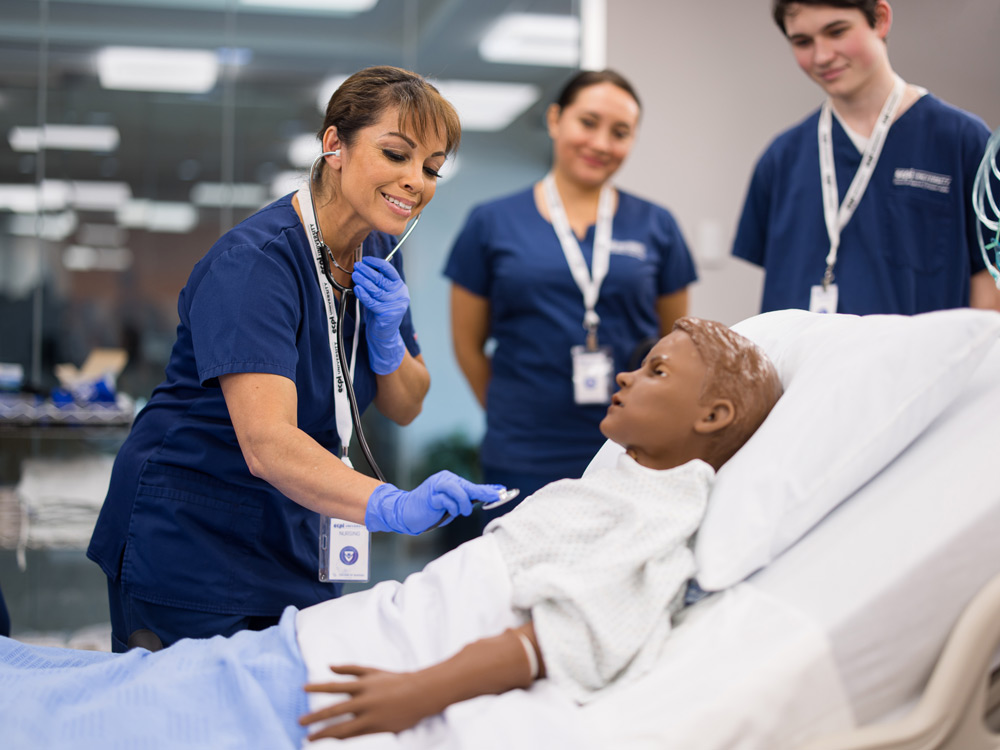
Imagine that you are with a family member at a doctor’s appointment. A nurse may introduce herself as an RN, while another lists BSN on her badge. One reflects a professional license (RN), while the other highlights a degree (BSN). You start to wonder, what is the difference between those credentials?
Whether you’re just starting your nursing career or changing your degree, today we will help you understand the nursing credentials RN and BSN, what they mean, and why they are important.
What Is BSN?
A Bachelor of Science in Nursing (BSN) is a comprehensive undergraduate program in nursing that prepares students to become registered nurses (RNs). Its curriculum also combines foundational nursing courses, knowledge and training in caring for critically ill patients, medical-surgical nursing, and preparation for the NCLEX-RN exam to become a licensed registered nurse.
Some employers require their current healthcare team to continue growing their education, while there are some that require nurses to have a Bachelor of Science in Nursing (BSN) due to the growing complexity of patient care.
What Is BSN In Nursing?
So, what does it mean to hold a Bachelor of Science in Nursing (BSN)? It is a nursing degree that expands a nurse’s ability to provide care, take on leadership roles, and advance professionally. Earning a BSN means you’ve received formal academic qualifications and training that meet the growing expectations of healthcare professionals and make your resume more impactful for employers.
In today’s fast-evolving healthcare world, many hospitals and healthcare systems prefer or even require nurses to hold a Bachelor of Science in Nursing (BSN) . Research shows that BSN is not just a degree, it’s a long-term investment in your nursing future.
How To Become a BSN?
Wondering how to earn your BSN? ECPI University offers flexible pathways:
- Traditional 2.5 year accelerated Bachelor of Science in Nursing (BSN): You can enroll in a BSN program right after graduating from high school.
- RN to BSN (12 months): If you are already a Registered Nurse you can earn your BSN and open the door to new opportunities.
Learn which career opportunities you could pursue as a nurse holding a BSN:
- Clinical Nurse
- Charge Nurse
- Public Health Nurse
- Nurse Case Manager
- Unit Supervisor
Those roles often lead to greater responsibility and pathways toward advanced degrees.
What Is an RN?
A Registered Nurse (RN) is a licensed healthcare professional who delivers hands-on patient care, collaborates with physicians and medical staff, and supports patients through health challenges. RNs play a critical role in monitoring patient conditions, administering medications, and educating individuals and families on wellness and disease management.
How To Become an RN?
The journey to becoming an RN varies depending on your educational path. Here you have different ways to become an RN:
Option 1: Earn an Associate Degree in Nursing (ADN)
This program focuses on foundational nursing skills and clinical training. Many nurses choose this as a quicker, more affordable entry into the profession. After completing your degree, you must pass the NCLEX-RN licensure exam, which qualifies you for a state-issued RN license.
Option 2: Through a Bachelor of Science in Nursing (BSN)
This degree prepares nurses with a broader skill set, including leadership, public health, and research.
Once you pass your NCLEX exam and become an RN, you might be able to discover new career opportunities. RNs can work in diverse environments and specialties such as:
- Emergency Room Nurse, also known as Trauma or Critical Care Nurse, is the first line of care in emergency departments. They assess and stabilize patients experiencing acute illnesses or traumatic injuries, often in high-pressure situations.
- Pediatric Nurse: They care for infants, children, and adolescents in hospitals, clinics, and pediatrician offices. They understand child development and tailor care to young patients' physical and emotional needs.
- Surgical/OR Nurse, also called Perioperative or OR Nurses, work before, during, and after surgeries. They ensure sterile conditions, assist the surgical team, and monitor patients during anesthesia.
- Geriatric Nurse: They specialize in caring for the elderly and support patients with chronic illnesses, memory issues, mobility concerns, and end-of-life planning.
- Home Health Nurse: They provide medical care to patients in their own homes, allowing them to recover from illness, injury, or surgery in a familiar environment.
- Hospice and Palliative Care Nurse: They focus on comfort, dignity, and quality of life for patients with terminal or chronic conditions. They work in homes, hospice centers, or hospitals.
As an RN, you’re not just administering medication, you’re a pillar of support for patients during their most vulnerable moments.
What Is RN To BSN?
RN to BSN refers to an academic bridge program designed for nurses who already hold an RN license through an Associate Degree in Nursing (ADN) or diploma program and want to complete their BSN. These programs are typically flexible and tailored for working nurses. Both ADN and BSN graduates must pass the NCLEX-RN to become licensed as Registered Nurses.
At ECPI University, our Registered Nurse (RN) to Bachelor of Science in Nursing (BSN) program is online and built to support adult learners. This program focuses on expanding your scope of practice, boosting your leadership skills, and preparing you for roles in management, education, and specialized care.
Whether you’re just starting out or looking to take your career to the next level, ECPI University offers nursing degrees that align with your goals, lifestyle, and aspirations, and prepare you to take the NCLEX exam with confidence. Through hands-on learning, immersive clinical experiences, and comprehensive test preparation, you could gain the knowledge and skills needed as a nurse. Explore our accelerated nursing programs here.

